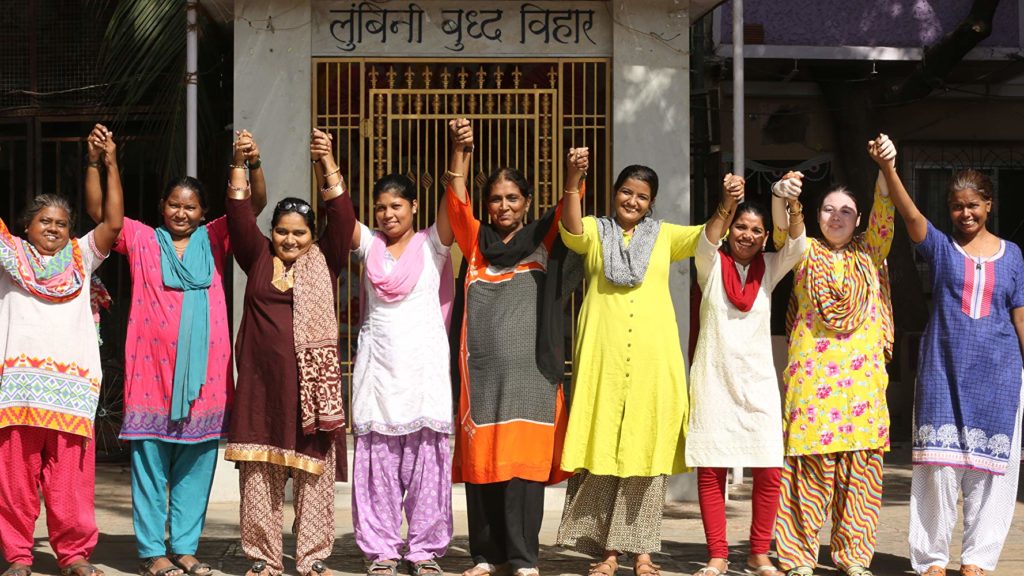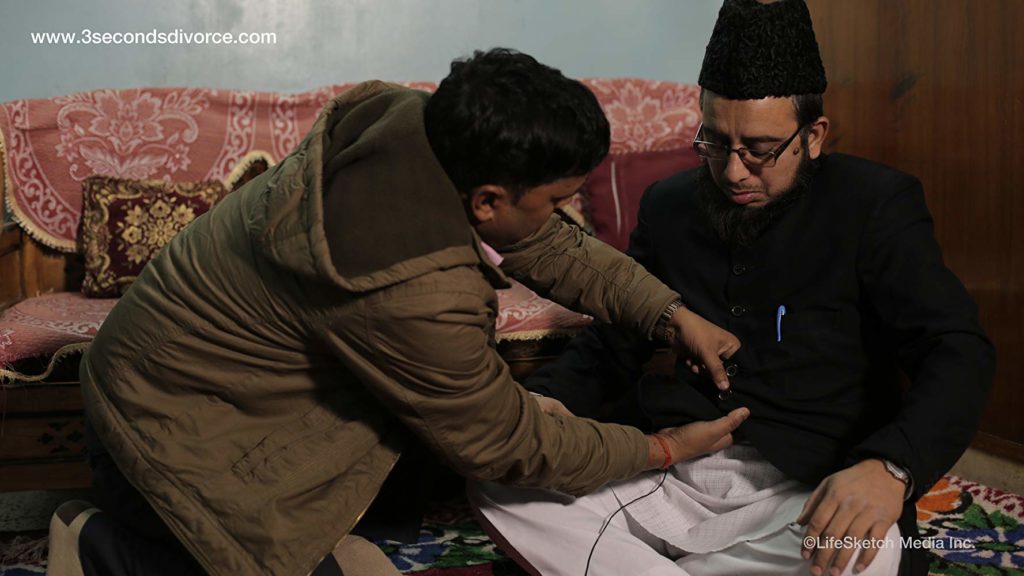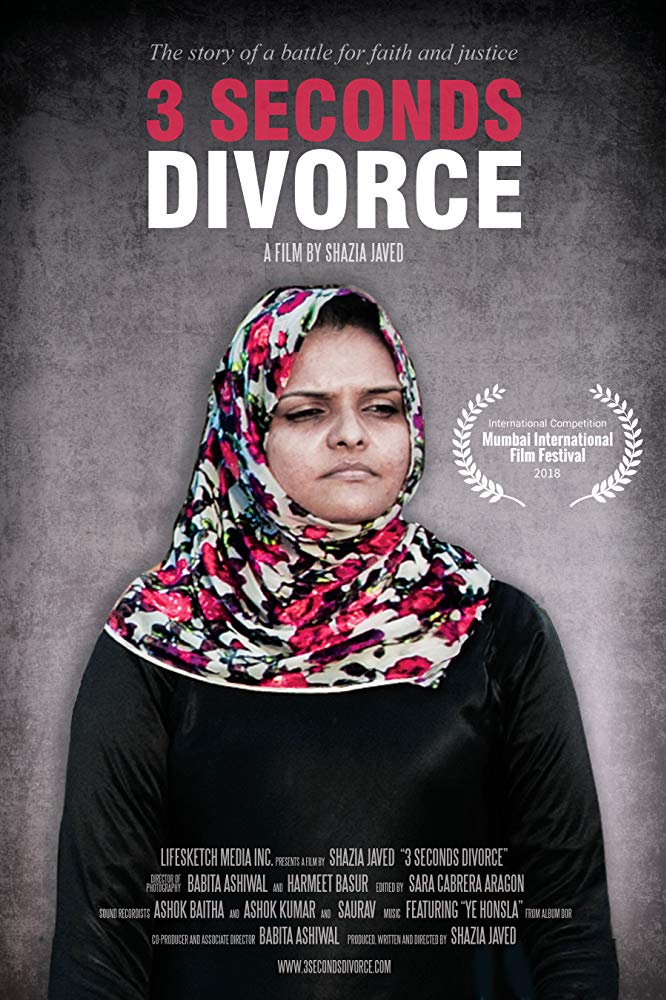If you’re married then you will definitely appreciate this story. Although it evolves from the sanctity and celebration of marriage, it is a story of divorce. In the majority of societies there can be a lengthy procedure when considering divorce. If there is a consideration to it, there are also steps and a time period leading up to it. Your marriage is usually a poem of considerations and promises; therefore your divorce should also contain many considerations and provisions… unless your faith and laws dictate otherwise.
In the documentary 3 Seconds Divorce by filmmaker Shazia Javed, we learn that there is a law within some Muslim faiths that allow a man to repeat the word ‘talaq’ three times to his wife to evoke an immediate divorce. If the husband has said it out of anger then the couple must go through ‘halala’. This process involves the now divorced woman getting remarried and then consummating the marriage before asking for a divorce in order to remarry her ex husband. This remarkable documentary lifts the veil of secrecy on acceptable laws and rules that exist in other cultures, religions and faiths. The film demonstrates the power and courage of oppressed women that unite and demand change because they are tired of taking a back seat.
Indo-Canadian Shazia Javed is an award winning filmmaker known for her previous film Namrata. She lives in Mississauga, Ontario and after I confused the time difference between BC and Ontario, she was still generous enough to speak with us about this groundbreaking film.
“What was it that compelled you to follow this story?”
“I grew up hearing about this practice and it always bothered me. It didn’t make any sense that there should be such a power equation in the marriage. For a man to say Talaq three times to his wife and then they’re considered divorced isn’t right. If he says it out of anger, then the couple has to follow a procedure in which the wife has to marry another man and consummate the marriage before she can ask for a divorce and then remarry her first husband. It’s very demeaning and I’ve always wanted to address it. I’ve always been appalled that this was legal and how can it be accepted in a court of law? When I began filming and interviewing the women I wanted to follow the protest as well as emphasize the mobilizing of the women.”
“How common is it for a men to implore a divorce using the method of repeating talaq 3 times?”
“I don’t know about the stats but the group that I followed had conducted a survey. It is acceptable and a lot of women say there is this constant roaming threat of this kind of divorce so women are afraid to get into an argument with their husband that could result in him saying it out of anger. It doesn’t apply to all Indians but just a certain section of the Indian Muslim community. Once the man says the three words he can’t retract them. If they wish to stay married then they have to go through halala. A lot of women will go through halala and I tried to show that in the film. It’s everything compiled to put women in that situation. Denying them financial independence, denying them an education, not supporting their independence and a system with little emotional support. When a woman has a child, she’s asked to go through this. I would call it the instant divorce; you’re married for 1 night, so it is a problem.”
“Now that the Supreme Court has discontinued the divorce practice, what method of divorce will men now have to use?”
“They will have to go through the courts. It’s still not very clear so the women’s group has come up with a draft/law that explains it. It is similar to what we have in other societies where you apply for a divorce followed by a cooling off period, during which you discuss the separation of assets, investigate whether or not you want to go through with the divorce. That is what they are now pushing for.”
“Is there a chance that this decision can be overturned?”
“There is no chance anymore. When it first went to court the leaders that were in a position of authority had petitioned to stop it but now that it’s been in the Supreme Court there is nothing they can do, it’s final. It’s really great to see the efforts of the women and it’s so good to see so much good come out of it.”
“How did you fund this documentary?”
“I didn’t have any funding. I did try to get people on board for funding but was unsuccessful. This was an important film for me to make, so when things started happening we kept shooting out of personal feelings and the generosity of a wonderful team.”

“How difficult was it to get access to the subjects in the film?”
“I think I had the advantage of being a local and having connections on the ground. My co-producer was based in Mumbai and the most difficult was to get access to some of the faith leaders. Fortunately I had enough connections to get into those places and get those interviews.”
“How long did it take to complete the film?”
“We started shooting in 2014 and shot for approx. 2 years. It just so happened that when we started shooting things really started to take off. The movement started growing and also how Lubna (subject in the story) was growing as a person. I think it was great that we were able to film long enough to capture her transformation. It also took awhile to edit the footage. We had a lot of footage and had to decide to leave some stories out in order to focus on this one. It also took awhile to get out and I’m so grateful it made it to Netflix because it makes it very accessible.”
“Did you believe that the petition to change the law would be successful after a judge had ruled against it the first time?”
“No, we had no idea and were just following the rhythm of the story. We could feel the momentum picking up with the petition and we were hopeful but there have been attempts in the past to change things. This time, I think women have had enough and they’ve been able to be better organized but we really didn’t know what was going to happen.”
“How has the reaction been out in Mississauga to this decision?”
“I think some people are cautious. There has been a lot of support from local communities as well as government organizations. There has been organized screenings set up as well as more screenings in July and August. There is a local screening coming up at the community center where there will be a lawyer and a faith leader on the panel. It will be a very important screening because it will bring the entire community out.”
“Is the wife allowed to seek out a divorce if she feels it’s warranted?”
“That’s not possible. She would have to go through the authorities and say, ‘I’m not happy in this marriage and I want out.’ She can’t stand and say ‘talaq’ three times.”
‘Does the Supreme Court decision affect all of India?’
‘In India, there are many faiths and this only applies to a specific Muslim faith community. The members are governed by their laws such as family, marriage and divorce. It’s based on their own scriptures. What’s been happening with the Muslim community is that there aren’t any defined/uniformed rules that are written down. You’d have to go to your faith leader and they would tell you that this is wrong and he’d tell you what to do because it is your faith and you agreed to it with your family and it has been accepted in a court of law. It was finally changed during the making of the film. The husband had faced boycott from the rest of his family if he didn’t follow this procedure.”
“How has the audience reaction been to this film?”
“It’s actually been pretty good because I’ve received a lot of support and requests from communities and there was a large screening in Burmingham, Ontario where there is a large community often activated by big issues. We have had discussions here in Toronto with Canadian consulate women onboard. At the local Canadian organization talking about how the issues can affect women here and where they can go for help if such a thing does happen and what they can do in that scenario, that’s been the best part about it knowing that it’s sifting through the community. In the Muslim community there are different interpretations. These are not God ordained laws and in India, the faith leaders that hold positions of power and people don’t want to challenge them but that’s what I’m trying to do. We can’t step aside and let this happen.”

“Are there other laws that Indian women would like to see abolished?”
“Yes, it’s a long process and the faith leaders will react differently so the women want a proper provision that would outline the process because it affects everyone in the community. They also want polygamy abolished and they recently won a court case in which Muslim women were now allowed to enter places of religious faith.”
“Did you have any concerns for your safety when you set out to document this story?”
“Not physically threatened because I’m privileged enough to live here and when I was there things had started to change and many people were on the ground. It was an emotionally exhausting feeling that you are responsible for your subjects and also realizing that the community could be impacted if the decision had gone the other way. I remember when the news came out all over India I was trolled online and called many names. I had gone into my shell for a while but then realized I had to finish the film and I had said what I wanted to say to the trollers so I focused on finishing the film.”
“Your previous documentary Namrata was about Namrata Gill. What is it about subjects that grab your attention to want to make a documentary about them?”
“That was an intimate one. Namrata immigrated to Canada and was sponsored by her husband. When she was getting married she thought she was going to marry a Canadian Indian and have a good life but it was just the opposite. He exercised his control over her because she was new. He denied her independence, education and was physically abusive. She became pregnant and had a daughter. She wanted to be a good role model for her, so she finally got out of the situation. She sought help and her father came down. He happened to be involved in emergency and non-profit that help women in these situations. The great thing about her story is that she went on to become a police officer and is now in a situation to help other women. I remember meeting her for the first time and telling her that she has to let me tell her story. I enjoy stories where women have been able to turn their lives around through a support system and are now passing the torch and helping others. I don’t want to portray women as helpless victims, I like to tell the stories of women that find a way out and find agency. They’ve been able to turn their lives around through the support of strong allies. There are many issues that we tend to sweep under the rug because they might be too taboo but I do think it’s time to talk about it and capture it on film. That is the draw and I love to tell those stories.”
Shazia Javed is taking some time off to recharge her batteries and catching her breath before she starts her next project. Making documentaries can take over your life and take years to complete. It is a marathon of emotion and endurance to reveal the stories that we need to hear. We can always learn something new and we can all get involved to help create change where it’s needed.

